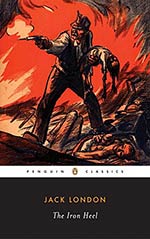
![]() spectru
spectru
7/21/2015
![]()
This book, The Iron Heel, is a manuscript that has been discovered 7 centuries into the future, 300 hundred years in the Christian era and 400 years in the era of the Brotherhood of Man. The manuscript was written by Avis Everhard. The driving force is her husband, Ernest Everhard. Everhard is a tireless socialist activist and revolutionary. He preaches the gospel in favor of Labor vs. Capital. Even when he addresses a group of capitalists, they are unable to refute his arguments. The book is very biased towards the socialist propaganda. The first third or so is a political diatribe in favor of socialism. The Fox News talking heads would be apoplectic.
Eventually, the propaganda fades and the story unfolds. The United States government is taken over by the trusts, industrial monopolies. The tyrannical regime that results is described as the oligarchy or the plutocracy. Everhard calls it the Iron Heel. The socialist comrades are driven underground. Ernest Everhard is arrested and imprisoned at Alcatraz. Avis becomes a spy in the Iron Heel. As her comrades plan their revolution, the Iron Heel learns of their plans and sends a force of soldiers and mercenaries to Chicago to teach a lesson to the revolutionaries. Avis tries to warn the socialists, but it is too late. She travels to Chicago with the government forces and finds herself engulfed by a mob of whom she calls 'slaves', and 'the People of the Abyss'. There is a terrible massacre of thousands and three days of street fighting. She unexpectedly encounters Ernest there. The manuscript abruptly ends, unfinished. The editors of the manuscript, its finders, have inserted footnotes throughout the text. From these we learn that Ernest Everhard was executed and that there were at least three revolutions before one finally succeeded.
Jack London published The Iron Heel in 1907. The story takes place from 1912 to 1932, London's future. He refers to the Russian revolution a decade before it happened. Being set in the future is the reason for it being classified as science fiction. It is more accurately speculative political fiction. In the battle in Chicago he describes war automobiles mounted with machine guns, though I think in 1907 the automobile was still something of a novelty. He predicted a war between the Americans and the Germans, beginning when the German fleet attacked the US fleet at Honolulu. The war was thwarted by a general strike of the workers in both countries. This led to the downfall of the German emperor and the rise if the Iron Heel.
The Iron Heel, not the greatest story telling, is interesting from an historical viewpoint, especially once we get past the socialist proselytizing. The Iron Heel is sometimes mentioned in the same breath as Orwell's 1984, but I think it could more appropriately be compared and contrasted with Ayn Rand's Atlas Shrugged. (It's a better written novel than Atlas Shrugged, and a much more pleasant length.)
I heard an audiobook from LibriVox - my first. https://librivox.org/ has "Free public domain audiobooks, Read by volunteers from around the world." I was reticent to download one, thinking the reading would be amateurish, but in fact it's quite professional.